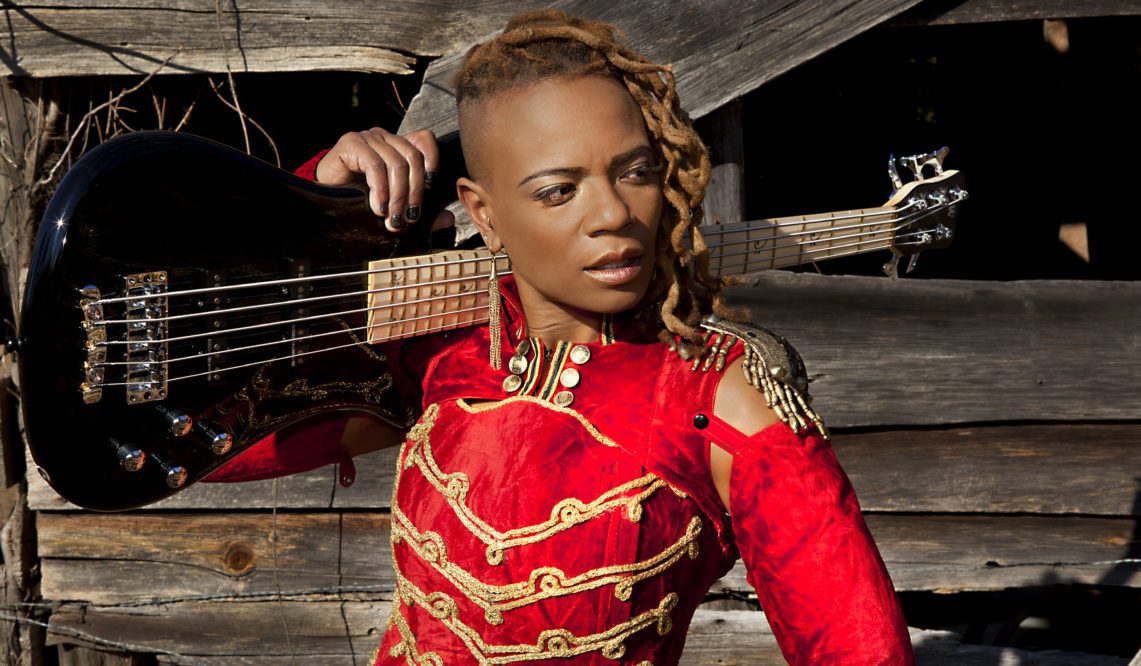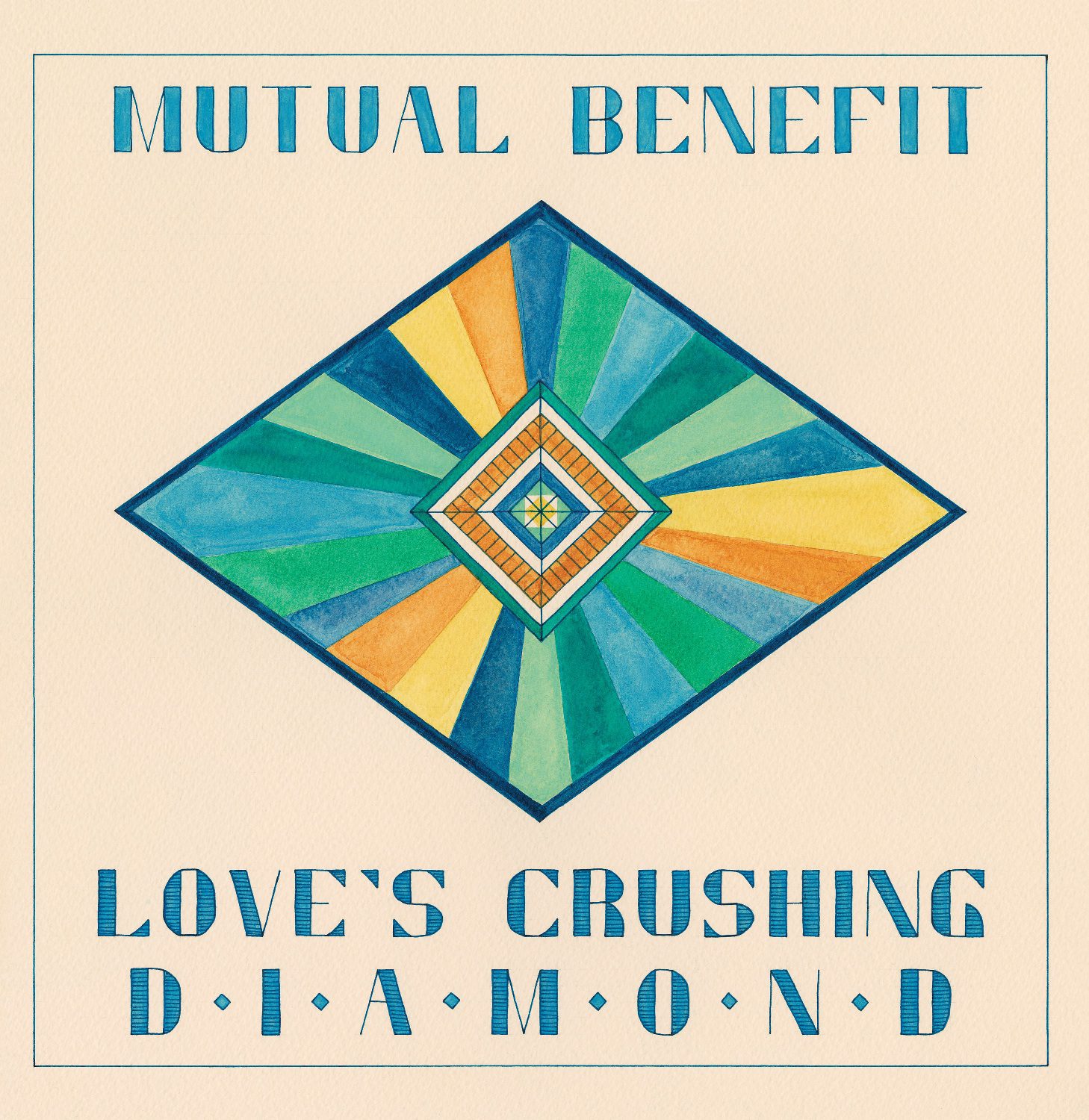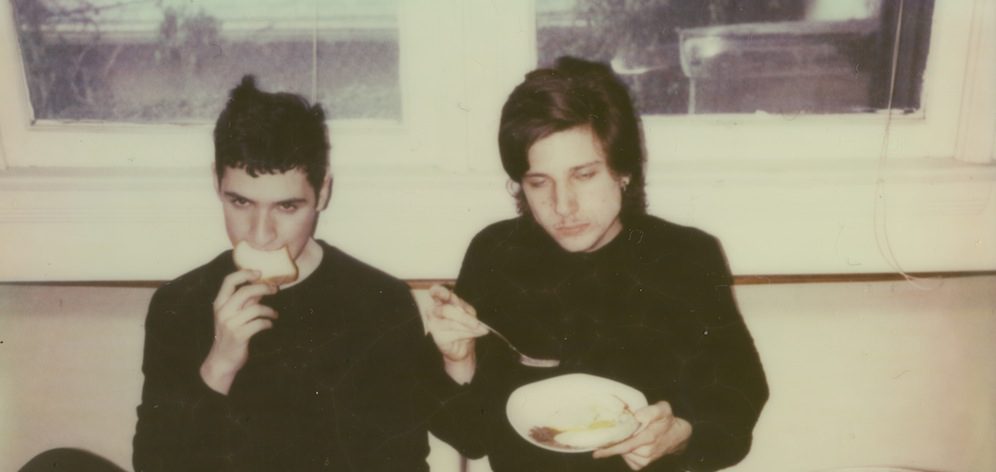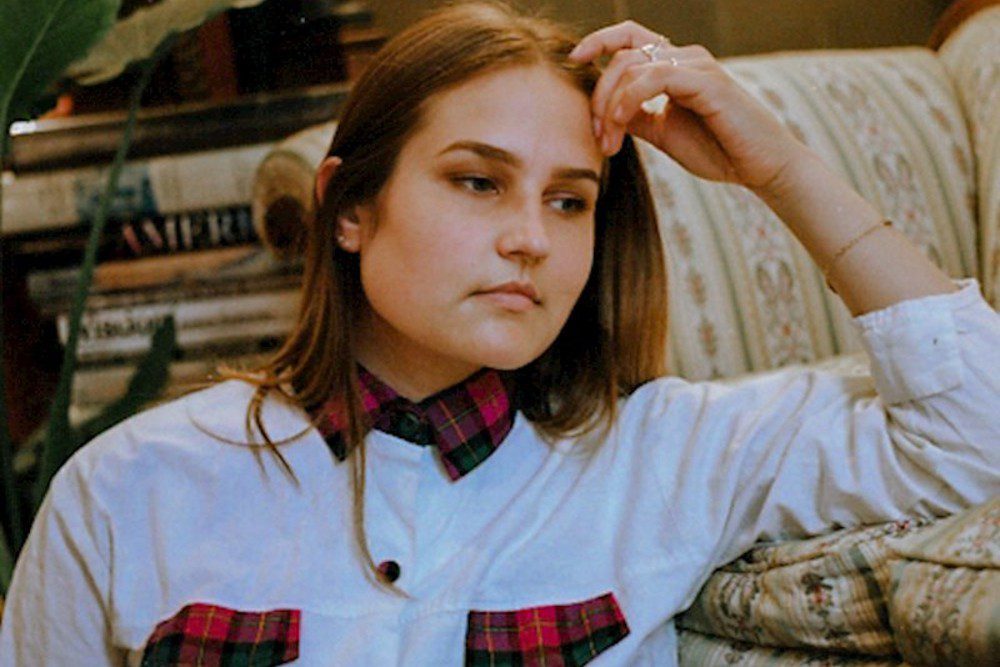
This year, Girls Rock Santa Barbara has developed The Summer of Love Internship, its first ever paid internship for teen girls and gender-expansive youth, which allows the organization to continue to provide a safe, collaborative environment in which to encourage lifelong skills like positive peer bonding and self-confident resilience. The internship, which lasts six weeks and pays each intern $500, offers six exciting and arts-focused disciplines: Record Label, Recording Artist, Social Media, Journalism, Photography, and Podcasting. Audiofemme is pleased to publish the following article, written by Alex Stadlinger and Katy Caballero, two interns from the Journalism program.

Artist, composer and bassist Divinity Roxx started out her career in 2000 when she attended Victor Wooten’s bass nature camp, where she met both the bass legend and his brothers, and by the end she was asked to tour with them. Appearing on two of Wooten’s albums, (Live in America and Soul Circus), she toured with the band from 2000-2005. But Divinity Roxx is probably best known as the touring bassist for Beyoncé from 2006-2011; having been featured on several of Beyoncé’s albums,she also became the Musical Director on the mega-star’s third and fourth tours.
But Divinity Roxx isn’t just someone else’s bassist. She self-released her first album, Ain’t No Other Way, in 2003 while she was touring with Wooten. Though working with Beyoncé kept her busy, she returned with a solo record in 2012, The Roxx Boxx Experience, fully cementing her sound as an artist who marries blues, rock, and soul in her own right. Her most recent album, Impossible, was released in 2016, and adds more funk to the mix.
Along with her solo career, she is a member of the OGs, an all-female band consisting of original members from Beyoncé’s 2006 touring band. This year, they released a song called “Higher,” recorded in partnership with Women’s Audio Mission in San Francisco and Plug-In Alliance. The song opens a conversation about our world today and how we need to stand up for ourselves and each other. Throughout her career, Divinity Roxx has been a shining light of women’s empowerment, self confidence, and mentorship to girls and women of all ages.
GRSB: The OG’s have been around for a while now, but you haven’t really released any music together up until recently with your new song “Higher.” What brought you together to make this song?
DR: Our percussionist Marci is a band director at a school in Salinas, California, and we were hanging out, having lunch, and we talked about recording – as we always do, except we never really do it, we just talk about it. I had an opportunity to record in a studio in California, and I invited them all out. Nobody had to pay for any recording time – I had hooked up with a woman, Terri, who runs Women’s Audio Mission in San Francisco, so we were able to use her recording studio. I had written this song, “Higher.” I sent the music to everybody and everybody liked it and so we recorded that song, but there are a number of songs that we all have written and we should record but who knows. We’ll take it song by song.
GRSB: “Higher” has a lot of powerful lyrics. What was the inspiration behind writing it?
DR: You know, it’s funny, because I had written that song maybe a year ago, at the end of 2018, maybe early 2019. I always want to write lyrics that are empowering, that are inspirational. I don’t want to just make music for the sake of saying something that sounds cool, that doesn’t have some sort of impact. The groove was so strong and there were so many things going on at the time and it’s so funny that it came out when it did because it was still so relevant. You could tell by the lyrics that I wrote it at a certain time because I referenced a couple of people who had been murdered by the police – I talked about Atatiana Jefferson and that was in 2019, and so we were in 2020 and George Floyd had just happened and the song was already recorded. It was so relevant because these things continue to happen and I wanted to say something powerful. I wanted to – I needed to – say something about it, because I hadn’t and the only way I feel like I can make my voice heard is through music and the lyrics. I want them to smack you in the face and wake you up as to what was happening in the world.
GRSB: Yeah, that’s really important and really inspirational. Will the OG’s be releasing more music together soon?
DR: I hope so, I hope so. It’s really difficult because we all live in different cities, we all have our own careers as individual artists, some of us are moms, some of us are professors at university. Tia Fuller is a professor at Berklee. Nikki Glaspie has her own band called The Nth Power. Marci is a full-time teacher, Katty is a full-time teacher and artist. I’m a full-time artist, so it’s just really difficult to get us together, get us all on the same page, get us into a studio, in a room and make a recording. I felt like I was lucky to get everybody in a room together to get [“Higher”] done, so I really do hope we are able to make some more music together because we are so powerful when we are together.
GRSB: Speaking on your solo career, do you have any new projects coming up that you can talk about?
DR: I’m working on an album and a stage performance piece called The Ballad of Debbie Walker. It’s sort of the origin story of Divinity Roxx. Debbie Walker is actually my birth name – I changed it to Divinity Roxx and it’s sort of like my superhero name, so I feel like I haven’t really given the world the backstory of Debbie Walker. I went in the studio in California, Zoo Labs, and got with my band and we started writing. I’m really excited about the record because it too is extremely inspirational and kind of talks about how I became who I am as an artist. One of my favorite songs is called “Happy Looks Good on Her,” so I’m really excited about it. I need to work on it more; I hope I’m able to release it next year, 2021.
GRSB: That’s really exciting! Going back a little, you recently re-released “We Are” from your album Impossible. What made you want to record and release that again during quarantine?
DR: Well I did it in partnership with a company called Austrian Audio. They are a microphone company and they are one of my endorsers and it was really their idea – they loved the song and what they wanted to do was remix it with some of their artists and use it as a promo video, not only their microphones but for the message that it was sending to the world at this time. They wanted to bring some positivity to their audience and they thought “We Are” would be a really cool way to do it. So we did a cool licensing deal and I’m really excited about it. I think it came out beautifully. The Impossible album has more jazz and funk and soul I think than The Roxx Boxx Experience record and I feel like it spoke more to the music I grew up listening to than the music I sort of got into once I started playing bass. When I started playing bass I got into rock music because it was just fun and you could just wild out on stage, but the funk and the jazz and the soul was kind of what I grew up on.
GRSB: And the song itself is inspired by a poem by June Jordan, right?
DR: Yes! You’ve been doing your research, I love it! June Jordan was my poetry professor at UC Berkeley; I went to UC Berkeley to be a journalist, and then I became a bass player! But June wrote a poem about South African women, and [“we are”] was the last line in the poem, she read it at the UN. It was a poem to protest Apartheid. I come out of that school of protest and you know, June really taught us. Early on she used to say “If you had two minutes to say anything to the world, what would you say?” And that sort of has been what my whole artistry is about. Every time I have an opportunity, it’s like, those are my two minutes.
GRSB: How do you feel like you use your platform to comment on social and political issues that are happening in the world today?
DR: I feel like music is an incredible vehicle to bring about social change because of its reach. There’s music everywhere. Everywhere we turn, everywhere we go, music is playing. It’s such an intimate and huge part of so many people’s lives. I really do feel like what Nina Simone said is relevant: “As an artist you are supposed to reflect the times. It’s your responsibility to reflect the times.” And for some artists that means something different. For me, as a poet and as somebody who came out of the June Jordan school of poetry where we have an obligation to criticize and to critically think about what it is in the world that’s happening, how it affects our lives, especially as a Black woman in this country, I have always been extremely involved in politics and in social matters and so that finds itself in my music because my music is a reflection of who I am. There are some people for whom that doesn’t happen, and that’s fine, but I feel like I have a duty for the young women who come after me and for the women who came before me to honor them and to continue to fight for the people who don’t have anybody fighting for them, for the powerless. So I really feel like that’s part of the reason why social commentary and political views and different things like that find themselves in my music. It’s just part of how I speak when I’m hanging out with my friends really.
GRSB: What inspired the change in genre between The Roxx Boxx Experience and Impossible?
DR: When I first started performing, I was so aggressive, and I was a lot younger too. I was really mashing up rock and hip-hop. In 2012 I wasn’t planning on releasing The Roxx Boxx Experience – those were old songs. I had moved out to California, hooked up with this guitar player, and he sort of convinced me that those songs needed to be heard. He was like, “You should put this record out.” I was kind of like, “Eh, I don’t know. Maybe put some other type of music out.” And he was like, “Nah man this is killing. We really should. It’s rocked out, it’s hard, it’s aggressive.” I was performing it out there, people were loving it. It’s such an L.A. type of record, you know what I mean?
So we put that record out, and I think those songs that were released on the 2016 album are songs that I had been writing since probably 2010 or something, but they all existed on my hard drive and I was on tour with my band in Europe and I was just letting them hear all these songs, and again they were like, “Why aren’t you putting this music out?” I was like, “Oh you know, it’s not ready…” And they were like, “No, we need to go in the studio and make this album.” So they sort of convinced me to go to the studio and make the Impossible album. The thing about Impossible is that I wanted to explore Divinity Roxx a little more. I wanted it to be more intimate. I wanted to tell some truths that I was avoiding telling on The Roxx Boxx Experience. It’s like The Roxx Boxx Experience was this facade of Divinity; Impossible was this little bit of opening into who I really am inside and what my inner, deeper thoughts are and how I feel. Honestly I said it was going to be my last album because I was frustrated with the music industry and frustrated with art, which happens. But that’s not true, it’s not going to be the last one.
GRSB: Can you talk about your role working with Beyoncé, being her bassist and music director? What does a musical director do?
DR: That was my first time being a musical director, but I was more of an assistant musical director. They gave me the title of musical director but Kim Burse was our boss. She was teaching us and sort of training us on what it meant to be a musical director. Since then I’ve been the musical director for a group called 21 and currently I’m the musical director for Fantasia, but the Beyoncé gig is where I learned what it meant to be a musical director and the job is really tough. You kind of have to get into an artist’s head almost. You help the artist come up with a setlist, you lead the band in creating arrangements. Some musical directors deal with the business of payroll. We hire musicians and identify which musicians would be good to form a band. We are always in communications with the tour manager about different logistical things that the band needs [in terms of] equipment. We are always in contact with the band members to make sure they are given what they need. We kind of help manage the band, make sure everyone is where they are supposed to be. Sometimes we set rehearsal times. We are responsible for making sure that the artist’s songs are cleared for performance a lot of the time. It depends on what organization you’re in, how deep the job can be or how surface it can be. Mostly we’re responsible for what you hear on stage.
GRSB: You’ve definitely played with some really cool people and on some huge stages – how do you feel like that’s shaped your career and your personal music?
DR: Wow! I’ve played on some really tiny stages too! This morning I woke up and somebody, one of my followers, had posted a picture and said, “Four years ago today Divinity Roxx played to a crowd at this place called This Ain’t Hollywood.” Like, there was nobody there, right? But we always play like there’s 20,000 people there, even when there’s nobody there. I think just playing has shaped my career and shaped my performance and how I perform. I have so much experience on stage because I’ve definitely put in my 10,000 hours on stages, whether the gig was filled to the brim with people, or there were three people there; whether it was outside at a music festival doing my solo thing, or on the stage at Glastonbury with Beyoncé when I was extremely nervous and afraid. I get a lot of compliments on my performance because I give it 100%. It’s one of the few times when I’m extremely focused – my brain is always like, “Do this, do this, oh, I should do this, oh you know what, I’ve got to do this.” My brain is usually all over the place, but when I’m on stage I am completely on stage. I am not thinking about anything else, I’m not wanting to be anywhere else, I’m not worried about my problems, I’m not even celebrating my victories. I am just in the moment performing whatever song it is and praying that people are experiencing something. I always pray before the show and ask God that He – or She – shows up and touches somebody’s heart. That is all I want to do when I get on stage. I want to touch somebody’s heart and when I leave and they leave, I want them to feel whole, you know?
GRSB: Are there any other influences that kind of shaped the artist that you are today?
DR: Oh man there are so many people, and they’re not all musicians! Some of my favorite writers are Toni Morrison and Chinua Achebe and Alice Walker. When I was a kid, Alice Walker was one of my biggest influences as a writer. I wanted to be a writer and a journalist so I think that those people really inspire me. Of course, there are musicians – Victor Wooten being one of the most incredible human beings on Earth and me having the opportunities to spend so much time with him and learn from him, he’s a huge influence. My mom is probably one of my hugest influences. Her support is immeasurable, has always been immeasurable. I’m one of those kids whose mom was always at the game embarrassing me, screaming for me and I would just be like, “Shut up. Stop screaming for me.” But you know, that’s what moms do. I was fortunate to have that mom who was always like, “You can be whatever you want to be and you can do whatever you want to do.” So I kind of feel like I’m a reflection of her in that way too with the inspiration. My mom’s ridiculous, she inspires so many people. So many people love her so much it’s crazy, but it’s because of the human being that she is, so I just want to be a good human on this Earth. We need more good humans.
GRSB: Being a woman in the music industry, have you dealt with any inequality or maybe experienced struggles with trying to make it?
DR: I mean, I think that being a woman in this world and doing anything is going to be tough. As a female journalist it’s going to be tough you know? There’s always going to be people that are going to doubt your abilities as a woman and whether or not you got where you are because you’re a woman or because you did something that men can’t do in order to get there. I grew up in a house where my dad never made me feel like as a girl I couldn’t do anything. He always taught me how to do things that he thought I needed to do, like if I needed to fix a car, he’d say, “Okay, here’s how you change a tire. Here’s how you do those things that women don’t traditionally do because I want you to be able to take care of yourself fully.” He taught me how to be myself and never doubt myself because I was a girl. I just never had that thing in me. I don’t even know what that’s like. But I have had people react to me negatively because I was a woman and for me I was just like, “Dude. I could probably beat you at that.” There’s always going to be people who are prodding you and who are competing with you and throwing out negativity about you and talking trash about you like, “Oh you’re never going to be this. You’re never going to do that.” Women are going to do that to you, men are going to do that to you. There’s always going to be obstacles, but don’t let nobody take your shine away, don’t let nobody take your love, your passion. Whatever it is that you want to do, you can do it. This excuse that we can’t do things because we’re women… we’re 51% of the population on the Earth! Are you kidding me? We can do whatever we want to do. We birth babies. We can do that! And we can still work and we can still have jobs and careers and create and flourish, so I just kind of brush it off a lot of times. I think when I was younger it really used to bother me and I felt like I needed to prove something. I wanted to fight against it. I wanted to get angry about it, but I think as I get older I’m just settled with myself. I know who I am and I know what I’m capable of and I know that whatever I’m not capable of, I’m capable of learning. Victor always says, [when] we look at all these incredible bass players and we say, “Oh, they’re so amazing,” [something] his mom used to say: “That person has ten fingers just like you, they have a brain, they have two arms and two legs and they walk this Earth and they can reason and think and they practice, so there’s nothing different about you. You just have to work at it.” So that’s just kind of what I do – I just keep working at it. There’s always going to be somebody better, but there’s nobody who’s going to do it like I do it.
GRSB: How do you want the world to remember you?
DR: Wow! That’s always a tough question. I want people to remember me as being honest and real and inspiring and as somebody who continued to want to evolve. I want to continue to evolve. I want to continue to grow. I want to continue to put goodness out into this world and that’s how I want people to remember me. I want them to remember my songs and my lyrics and think about how they make you feel on the inside. It’s just like doing a show – this life is a show. I think the Red Hot Chili Peppers said that in one of their songs. This life is not a rehearsal, it’s the real thing, so this is my show, this is my stage, this life, this is my outfit, this is my wardrobe, my bass is my weapon of choice and I try to live this life as honest and as real [as I can]. I hope that anybody that comes in contact with me in any way, shape, or form will leave feeling a little bit better than when they first came to me.
Follow Divinity Roxx on Instagram for ongoing updates.




